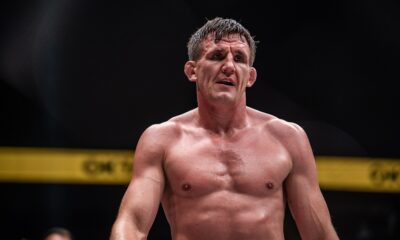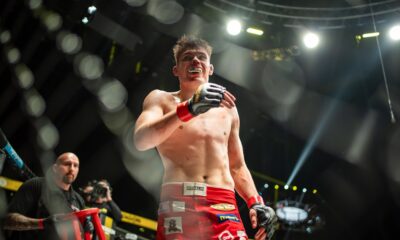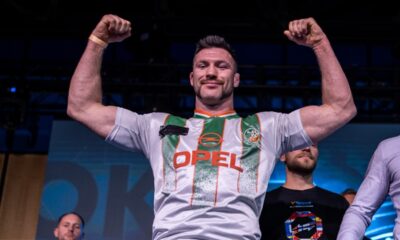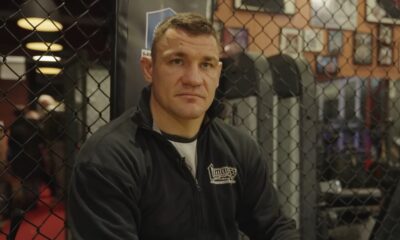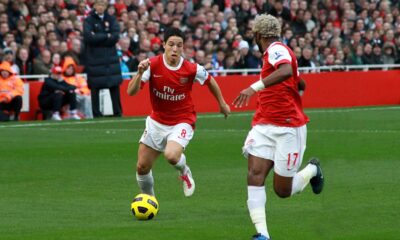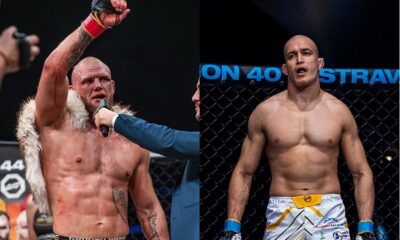Football
Karel Häring: The pressure will be on the Croatians. I believe in a draw, which will de facto ensure the Czech Republic’s progress
A draw will de facto guarantee us promotion. Karel Häring, a renowned sports journalist, spoke to Ruik about his career as a journalist, about Slavia and the ongoing EURO.
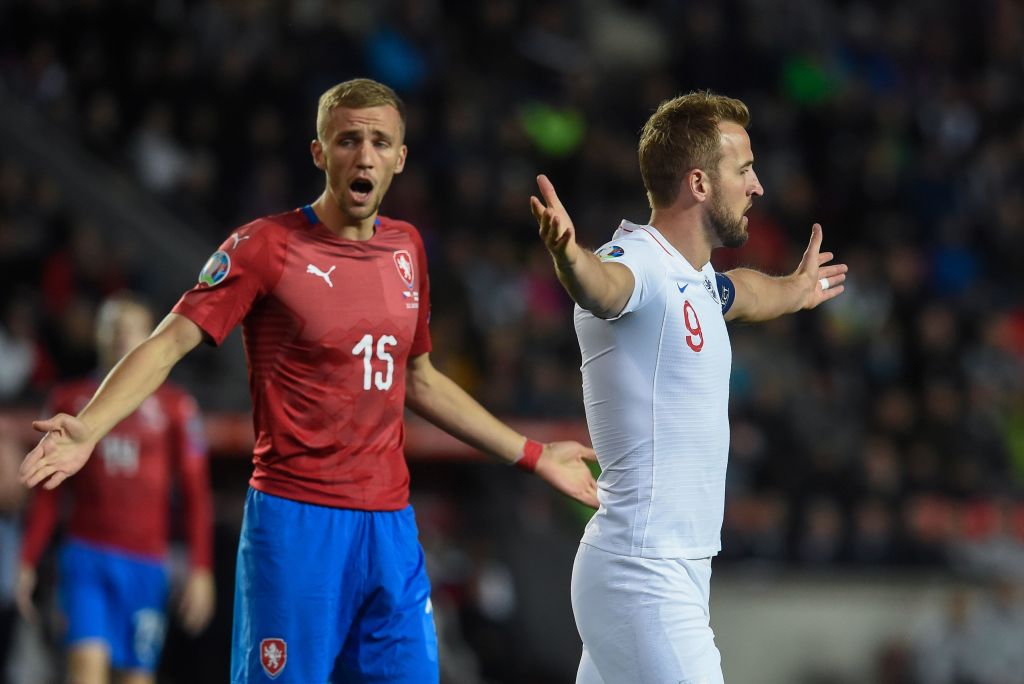
A draw will de facto guarantee us promotion. Karel Häring, a renowned sports journalist, spoke to Ruik about his career as a journalist, about Slavia and the ongoing EURO.
In the field of sports journalism, you are among the best that the Czech scene has to offer. When did you decide to take up this profession?
Thank you for the compliment. I appreciate it, also because I fell out of the classical news journalism some time ago. I have always been around sports, I used to play hockey, football, I went to the Bazaly in Ostrava from the age of five. Like a lot of fans, I used to make various cuttings of results, tables and so on.
I decided I wanted to go into sports journalism sometime after high school, although I took a bit of a detour. I didn’t get into full-time football writing until 2000 when I joined the Sport daily.
Do you think of journalism more as a profession or a hobby that you enjoy?
It’s a combination. If it wasn’t a hobby at the same time, it’s probably not something you could do for a long time, because it’s quite a time-consuming job. But as a couple of friends once told me, it’s a ‘dream job’. Which is true, despite some of the downsides, because for example there is certainly less time for family than one would like. The most common phrase they heard at home was: ‘it should be freer next week’. It wasn’t.
For many years you wrote for the daily Sport, where you did many interviews with Czech and foreign footballers. Is there one you respect more than others?
Leaving aside the biggest Czech stars for now, because they were easier to get to, the group of one-on-one interviews I respect the most definitely includes Thierry Henry, Iker Casillas and Steven Gerrard.
Even after leaving Sport, thanks to Vladimír Šmicer and Petr Čech, I got to see Robbie Fowler and John Terry, who impressed me a lot. Standing next to him, I understood that his teammates could feel safe on the pitch. He’s got charisma. Fowler was a dream come true for me, he was my favourite striker in the 90s. Although understanding his English was very difficult..
You also participated in three World Championships and the same number of European Championships. How does it go from a journalist’s point of view at these championships?
I call it a beautiful routine. From the first day you arrive at a tournament, you work from morning to night, at least three articles a day, but usually more. Without a day off, there’s travel involved. We did a lot of traveling in France 2016. From Tours, where the team was staying, we drove to Toulouse, St. Etienne and Lens in succession. At least four hours, more like five.
There the day before the game, back the day after the game, so you arrive at the hotel sometime around 2 or 3 in the morning. And around 10:00 you have to be at the stadium for training and interviews. It’s a little bit looser when there’s no Czech team in the tournament. You can plan it better. But again, it’s not as popular in the Czech Republic.
The fatigue at tournaments is outweighed by the fact that you know there is much more interest in the media among the fans, the articles have more impact. You just know that the work is worthwhile at that moment.
In 2016, you quit the Sport daily. What led you to this decision?
There were several factors. But it was becoming routine after 16 years. After a while, you get tired of going to a match in Plzeň on Saturday afternoon, for example with Karviná, which turns out to be 2:0, and you have to turn it into several articles, even if it doesn’t offer too many interesting topics. And you have both weekend days killed.
I wanted to move on, but there weren’t many options within the editorial office. Plus, I got an offer from a foreign company, so I decided to make a change. Overall, it helped me.
You now write and run the quarterly magazine Football Club, which regularly provides readers with comprehensive articles spanning the pitch and ninety minutes. How did the idea for this magazine come about?
My friend Jan Kaliba and I, who worked for a long time as a sports editor at Radiožurnál and since the summer of 2017 has been a correspondent for Czech Radio in the USA, were subscribing to the English quarterly The Blizzard, which we liked because it didn’t stick to mainstream topics but dealt with football from all possible perspectives and in depth.
We thought we’d give it a try too. Then, together with Jiří Hora and Guillaume Narguet, an editor in the French section of Czech Radio, we launched it in June 2017.
But you also collaborate with the English magazine FourFourTwo. How does the collaboration work?
It’s very much on a whim. Mostly it’s that they get in touch themselves if they want me to write something. For example, I did a chat with Karel Poborsky about his famous goal for them, from all sorts of angles. On the other hand, in the case of The Blizzard, the way it usually works is that you suggest a topic, and if you like it, you can write it. Now I owe them one text, I have to catch up over the holidays..
Are you a fan of any team? Whether Czech or foreign?
It’s difficult to talk about Czech clubs, but every journalist grew up somewhere rooting for a club. I’m from Ostrava, so as a kid I was a fan of Baník. But when I joined the Prague editorial office of Sport, I rarely got to write about Baník, which I took as an advantage. Abroad, it’s Liverpool.
The domestic scene in recent years has been clearly dominated by Prague Slavia. How do you explain its dominance?
That’s a very long debate. The bottom line is that it has managed to stabilise financially after those crazy years when it was on the verge of relegation and collapse. She bet on the right people, whether it was the coaches Jaroslav Šilhavý or now Jindřich Trpišovský, or the sporting directors. First Jan Nezmar, who was replaced by Jiří Bílek.
If I were to summarize it in comparison with Sparta, Slavia did not avoid mistakes either, but managed to learn from them. Nowadays, they are also managing better and overall they are working well. Czech football needs the two big three clubs to thrive and be a step up from the rest. Balance does not bring quality, it is a sign of the opposite.
But it thrives on European soil. Twice Europa League quarter finals, once Champions League group stage. Will the management, together with Jindřich Trpišovský and his implementation team, have to solve the “problem” of the high interest in their skeleton team in the summer?
It probably will. As it happens with most teams that make a significant impact in Europe. It’s a natural progression. Football is a business. Unless we’re talking about the best and richest clubs, they have to sell. The crucial thing, but also the most difficult thing, is to find a balance between the economic side and the quality of the squad. Slavia is certainly not in a position to sell everyone for whom a decent offer comes, but there will be a few sales.
Who all do you think will leave Eden in the summer?
As I am no longer in the newspaper, I don’t have more precise information. But from what’s been reported, I see the most likely departures as Peter Olayinka, Abdallah Sima, although things may get more complicated with him, and goalkeeper Ondrej Kolar.
The current EURO will also play an important role. Can it either become a stepping stone for some players on their way abroad, or can it also derail a possible transfer?
We can find cases of both possibilities, but there are more of the former. If you have a successful EURO and the team reaches at least the quarter-finals, it will attract a lot of attention. Just remember what clubs Czech players transferred to after their success at EURO 1996. Karel Poborský to Manchester United, Patrik Berger to Liverpool, Radek Bejbl to Atlético Madrid.
Our players had a good start to the championship, they beat Scotland 2: 0 after Patrik Schick’s goals. How did you like the performance of the Czech national team?
I probably won’t say anything new if I mention that the result was better than the game. But the three points are crucial and can bring more peace of mind after an unconvincing preparation. Not many people are in top form at the start of a tournament. Italy is an exception, but when I think of France at World Cup 2018 or Portugal at EURO 2016, both teams got off to a very slow start.
Patrik Schick’s second goal was perfect, it may well be the best goal of the championship.
There probably won’t be many nicer goals, but even if he doesn’t win any polls afterwards, he will definitely make history, and as soon as there are various documentaries or programmes about EURO 2020, he will always be there. Moments like that live a really long time. Like the Karel Poborski lob I mentioned.
Goalkeeper Tomáš Vaclík also had an excellent performance. Is he aware that he can now fight for one more foreign engagement?
He certainly knows that he can improve his bargaining position, which is good anyway, because he will be free. I think he’s going to have to decide between two paths. Either he goes to a club with ambitions to catch regularly, or he can be engaged by some of the really big European clubs as an experienced, mature number two.
From what I’ve heard, there are at least two European giants interested in him, and I don’t mean Real, who have been talked about. Tomas is 32 years old. At his age, opting for the second option, even at the cost of not getting in goal as often, would be worth considering. You get a lot of contacts that you can use after your career is over.
Lukas Masopust, often criticized by fans, had a good opening game. Will he keep his place in the starting line-up or will we see a change in the next matches and will Adam Hložek start in the starting eleven?
I would say he will keep it for Croatia, but it will be decided before each game. Adam Hložek has indicated as a sub that he is feeling fine. On the other hand, he still doesn’t have as much experience of big football as Lukas Masopust and maybe the role of a joker will suit him at this stage.
On Friday we will face Croatia. How do you expect it to go and do you think we will secure our participation in the knockout stage?
The pressure will be on the Croatians, who may have more individual quality, but the Czech team can be very well organised and the starting position certainly plays in their favour. I don’t follow the Croatians very often, but even from what I’ve read, it looks like they are not at the level of the 2018 World Cup anymore. Maybe I’m wrong, but I believe in a draw, which will de facto secure the Czech Republic’s qualification.
We will finish the group stage with England, one of the favourites to win the overall title. Do you think Gareth Southgate’s team can rise to the top?
They can, because they have a team packed with great players. On the other hand, England and the Euros have never really gone together. It’s more of a patchwork of disappointments, which is why I’m more cautious, even though I’d like to see it succeed significantly. The advantage of the current selection is that the media is behind it (it started at the 2018 World Cup), which hasn’t been the case in the past, and the exaggerated expectations and criticism have ground down much more experienced fighters.

